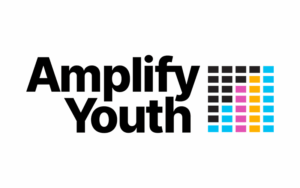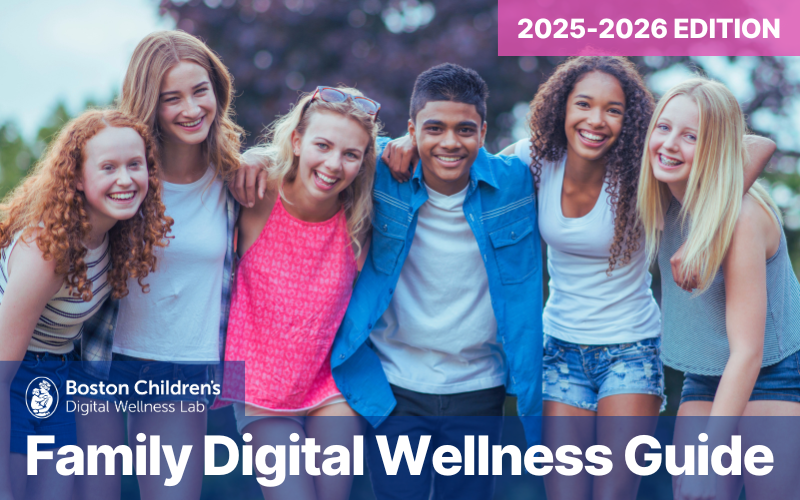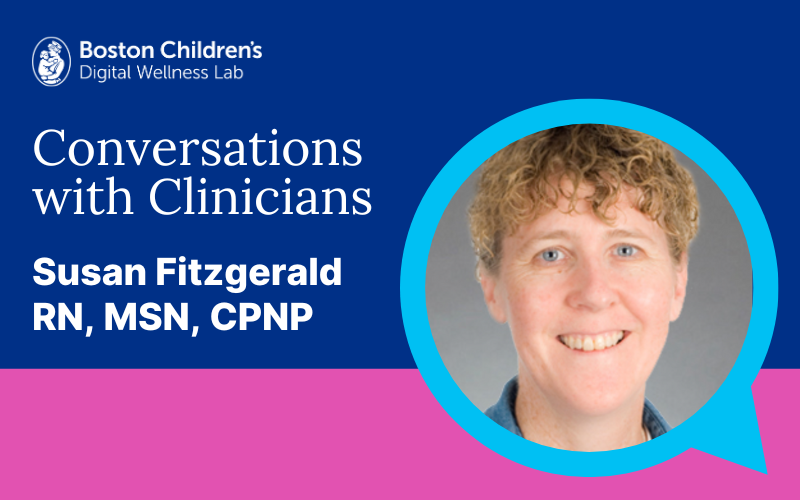Susan Fitzgerald, RN, MSN, CPNP
Program Director, Boston HIV Adolescent Provider and Peer Education Network for Services (HAPPENS)
Advanced Nurse Practitioner, Division of Adolescent/Young Adult Medicine, Boston Children’s Hospital
What is your role at Boston Children’s?
I am a nurse practitioner, a primary care clinician, and the Director of Boston HAPPENS, the Adolescent and Young Adult HIV program at BCH. We are a small, but mighty, team specializing in supporting kids who have HIV, working to get them to a level of undetectable and non-transmissible disease. We provide exposure prophylaxis (i.e. getting kids who have been exposed to HIV on prescriptions to prevent infection) and follow up with kids who have suffered sexual assault or trauma and are at risk for getting HIV, to link them in to care. I see my job as giving all young people agency over their own health care and helping them to be advocates in the care they receive.
What does a “day in the life” look like for you in your role?
My days are a mix of following up with current patients, urgent care visits, crises, and trying to secure grant funding. I have an open access model, so any of the young people I follow can email me and be seen the same day. It’s a great model, and 98% of the time it works out, and some days the 2% is a bit challenging. But when a kid needs to talk, we can be there for them.
What is Boston HAPPENS and what do you do there?
Boston HAPPENS (HIV Adolescent Provider & Peer Education Network for Services) provides services to youth 13 to 25 (and primary care patients of the Division of Adolescent and Young Adult Medicine and consult and referral patients) who are HIV positive or at risk for the disease and other STIs. We also offer HIV counseling and testing and hepatitis C testing for teens and young adults as well as STI (syphilis, gonorrhea, trichomonas, Hepatitis C and chlamydia) testing. Our services are available to anyone with insurance, including MassHealth and we also offer free rapid HIV testing for those patients without insurance.
We have funding from the Boston Public Health Commission which allows us unique opportunities to help with social determinants of health that prevent youth with HIV from taking medications. This funding will help us to be part of the solution to ending the HIV epidemic. We can help patients cover financial needs in the short term by providing assistance with housing rental payments, meds, and meals through a unique food delivery program. Our meal program has been a big success — our nutritionist develops culturally and ethnically sensitive recipes — the patients actually eat the meals! We are even able to get them utensils including pots and pans. All of this goes into creating a network that supports them to get healthcare. The program supports efforts to improve health, and access services that allow them greater independence and ultimately, give our patients the support they need to manage their illness.
For patients with mental health needs, it’s a lot of crisis intervention, sometimes long term. We try to eliminate as many of the barriers as possible to get them the care they need.
There’s a young woman I’ve known for a long time, she just turned 25. She’s the first in her family to graduate high school, got a scholarship for college. Both things that seem like they have nothing to do with her healthcare, but have everything to do with her healthcare! So much of our appointments are about, “What you want to do? Where do you want to be?” We give young people permission to take charge of their lives and help them learn that knowledge is never wasted — you can change your mind later about what job you want, but the knowledge is yours forever.
What led you to this work?
I got here totally by accident. If you had told me when I started that I’d be in Adolescent and Young Adult Medicine, I’d have said, “You’re crazy!” When I first graduated, I worked in a special care NICU and I was in the military for a long time. My first job as a nurse practitioner was in pediatric surgery and trauma. From there, I went to a clinic that served a lot of patients in state DCF custody and in the prison system. All my work has ended up being with young people who are high risk and don’t have opportunities to access healthcare. I love the work and the incredible strengths that these young people have. Once I started working with them and say what an amazing group of people they are, the commitment to stay was easy.
What do you see as the greatest challenges facing kids growing up in a digitally-saturated world?
I think that there’s a plethora of information coming at young people today that is not vetted. There’s no established lens to help anyone, our patients or otherwise, determine the difference between someone thinking out loud and what is a scientifically or medically sound recommendation for care.
COVID brought that out more than anything — it was hard to know what was real, what was speculation, and what was just plain fallacy. I also think now if you don’t like something you can say it’s “fake news”, and use that excuse to not believe the truth.
Every day, we are bombarded with emails, social media — messages and information that are clearly false — we know it’s not true, but young people don’t.
“When we allow people to put information online that we know is dangerous or wrong, that hurts people, and especially kids. We need to find ways to help young people sift through it all and learn to discern truth from fiction.”
Because there was a lot of information put out there during Covid that was clearly wrong and there were no consequences for that, I think the medical community lost some credibility. We’ve lost young people’s trust in being able to show them information that we know to be credible and have them believe it. Now, they think, “Why should I believe you?” A lot of the work we end up doing is relationship building; if you have a relationship with your patient over time, then you gain credibility.
What guidance or advice do you have for parents and other caregivers to help kids to build and maintain healthy behaviors around digital media and technology?
“My favorite saying is ‘knowledge is power.’ Rather than filter information, I say, ‘Here are the pros and cons. You may not like what I say, but we can talk about it and you can make a decision that’s right for you.’ I believe in planting the seed and nurturing it. I’ll ask, ‘Which options will work for you?’”
We need to stop looking at the ideal and say, “What’s gonna work? How can we start the journey?” I don’t know how many times adolescents and young adults come in for a physical, and they tell me, “Well, I’ll do Y, but not X or Z”. I wanted them to do X,Y, and Z, but they’ll come back because I let them decide what they wanted. If I can build trust and they come back year after year, eventually we will get there. We need to give our patients a voice in their healthcare and help them be comfortable accessing and challenging the adult healthcare system.
“It’s important for us adults to have the ability to be okay with what we don’t know — being humble enough to say we don’t have all the answers, that we’ll figure it out together.”
We also have to frame what we tell our patients to do to match their reality. I had this one patient who wanted to lose weight, so my advice to her was to start to go out and walk. She ended up telling me that she was afraid she would get shot while out walking. So, for her, walking wasn’t the right answer. Acknowledging her safety concerns and asking her, “What are ways you think you could get more exercise in?” allowed her to come up with a solution that was her idea and matches her reality.
We need to explore challenges with our patients, not make them feel like failures because they don’t know something, or didn’t do something.
How would you change, design, or use technology and/or media to be healthier for kids across the developmental span?
You know I think it’s interesting, because how we use tech is generational, and it changes — that makes it really hard. What’s going to work with kids who are 12 now? They’re already doing things with technology that 25 year olds don’t know about. Where do we, clinicians like me and the tech companies, need to go to keep up with that kind of innovation and advances?
Another danger, and youth are very aware of it, is the question of, “Am I going to get hacked? Is my medical information going to be all over the place?” We can tell them no, but then we see the headline about the latest agency or company to get hacked. Also, what if the youth lives in a state where the government doesn’t like who they are — I’m thinking of trans patients here — these patients are thinking, “Can they get my healthcare information?”
“My question for tech companies is: What’s your plan for keeping up with the shifting realities and making sure everyone’s privacy is protected?”
As an institution, I think we need to always be exploring ways to push information out in the way patients are communicating and consuming information today. We have a portal, but it’s a bit of a barrier for a lot of young people because sensitive material like STI or HIV results can’t be posted online, regardless of age. Also, many youth don’t like using the portal because they can be in relationships that are abusive or manipulative with partners who say things like, “You have to show me your records,” or “Did you talk about me?” I often have to classify notes as confidential at the patient’s request for their safety. Social deterrents like this can really impact their healthcare.
We need to have a bigger spectrum of how we get credible information into youth’s hands. Like text messaging — we use it at HAPPENS — it’s the way people, especially youth, communicate today. We don’t use names or identifying information or details about their health but the youth know the message is from us and can call us back and talk to a human right away or text us back. Communicating information where youth and young adults are, like through videos on YouTube is also something we should be doing more of.
I guess what I’m saying is that the healthcare industry, hospitals like ours, and insurance companies need to keep up with the technology that young people are using today. And tech companies need to create the tools to help us communicate with our patients in a safe way. A lot of that actually is bringing young people in, asking them what they need and how they want to get accurate information. We need to hear it from them.
Here at the Lab, we welcome different viewpoints and perspectives. However, the opinions and ideas expressed here do not necessarily represent the views, research, or recommendations of the Digital Wellness Lab, Boston Children’s Hospital, or affiliates.








